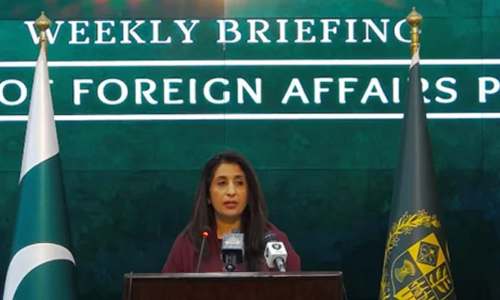Pakistan’s Foreign Office (FO) has strongly criticized India for its alleged role in the murder of Sikh leader Hardeep Singh Nijjar, characterizing it as an indication of India’s global network of state-sanctioned targeted assassinations.
During the weekly press briefing in Islamabad on Wednesday, FO spokesperson Mumtaz Zahra Baloch addressed the media and pointed out that reports of Indian involvement in an extrajudicial killing in Canada demonstrate that India’s “extraterritorial killing network” has expanded internationally.
In response to Canadian Prime Minister Justin Trudeau’s statement about “credible evidence” linking India to Nijjar’s murder, the FO spokesperson emphasized that India’s assassination of a Canadian citizen on Canadian soil constitutes a clear violation of international law and the UN principle of state sovereignty.
Baloch described the incident as a “reckless and irresponsible act” and questioned India’s credibility as an international partner and its claims of increased global responsibilities. She also recalled India’s history of involvement in extraterritorial activities, particularly through its premier intelligence agency, the Research and Analysis Wing (RAW), which has been linked to abductions and assassinations in South Asia.
The incident revolves around the murder of Pro-Khalistan Sikh leader Hardeep Singh Nijjar, a prominent advocate for an independent Sikh homeland (Khalistan) and a local leader of Sikhs For Justice and the Khalistan Referendum campaign. Nijjar was fatally shot on June 18 outside a Sikh cultural center in British Columbia, Canada.
Baloch also reminded the audience that in December 2022, Pakistan had released a comprehensive dossier containing concrete and indisputable evidence of India’s involvement in the June 2021 Lahore attack, which was planned and executed by Indian intelligence.
Separately, the FO mentioned Kulbhushan Jadhav, a high-ranking Indian military officer, who had confessed to his involvement in directing, financing, and executing acts of terrorism and sabotage in Pakistan.
Canadian Prime Minister Justin Trudeau had earlier stated in the House of Commons that Canada’s national security agencies are investigating “credible allegations” of the involvement of “agents of the government of India” in Hardeep Singh Nijjar’s killing. Canada identified the diplomat expelled for plotting the Sikh leader’s murder as Pavan Kumar Rai, the head of India’s RAW intelligence agency in Canada, operating from the Indian High Commission.
This situation has triggered a diplomatic standoff between the two countries, with Canada expelling the Indian intelligence operative Rai and India summoning the Canadian High Commissioner in New Delhi and instructing him to leave the country within five days.
Furthermore, addressing Indian allegations linking Pakistan to the Anantnag encounter in the Indian Illegally Occupied Jammu and Kashmir (IIOJK), Baloch emphasized that India has a habit of trying to implicate Pakistan in events that occur under its control, particularly in the illegally occupied territory.
Regarding Pakistan’s engagement with India at various levels, the FO spokesperson mentioned that the primary channel of communication, i.e., diplomatic missions, had been reduced to charge d’affaires. She also noted that a DGMO-level channel of communication existed between the two countries, if it was functional.
Pakistan expressed its willingness to engage in talks with India to resolve all disputes, especially those concerning the core disputed Himalayan territory. Baloch also stated that Pakistan welcomes third-party mediation on the IIOJK issue based on UN Security Council resolutions and international law principles.
Meanwhile, Baloch highlighted India’s alleged state-sponsored human rights violations in the occupied valley, noting that Indian occupation forces in IIOJK have been responsible for the deaths of 68 Kashmiris, including women and children, with 13 custodial killings in the first eight months of 2023 alone. Additionally, she mentioned the arbitrary arrest of 2,900 individuals, including political activists, businesspeople, women, and youth in the region.
(Islamabad_Newsdesk)













